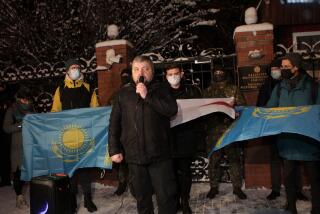NONFICTION - Oct. 15, 1995
- Share via
TALKS WITH T.G. MASARYK by Karel Capek, edited by Michael Henry Heim (Catbird Press/A Garrigue Book: $13.95 , paper; 256 pp.). Thomas Garrigue Masaryk appears in history books mostly as the first president of Czechoslovakia, a position he earned for his exile leadership of the not-yet-a-nation during World War I--a leadership highlighted by his persuading Russia in 1917, to release Czech and Slav prisoners of war in the form of a neutral army, the Czech Legion, which subsequently marched home by way of Siberia. But war-hero Masaryk makes only occasional appearances in this book, a collaborative memoir first published 60-odd years ago; the Masaryk typically found here is much more human, a professor who cancels classes when he feels too “morally depressed” to teach responsibly, who discovers a minor boating mishap can become a convenient way to court his future wife. Talks with T.G. Masaryk is not, in other words, your run-of-the-mill political autobiography; it’s informal, being an oral monologue, yet literary due to its shaping by novelist Karel Capek. One can only guess at the extent of Capek’s contributions, but Masaryk, in any event, comes off as modest and charming, indeed quite like the “Philosopher-King” the book’s publisher refers to in his foreword (and in which he notes that the Catbird Press’s Garrigue imprint is named after Masaryk’s American wife). Masaryk really was a philosopher, having written a PhD thesis on Plato, and as a teacher in Prague tried to free his countrymen from “our one-sided intellectual subservience to Germany.” And political subservience to Austria-Hungary, too, though from this account it’s easy to conclude that Masaryk was drafted into Czech nationalism and government service, since he seems happier talking about country life and his handful of argumentative meetings with Tolstoy. Masaryk tells numerous compelling stories in this book--such as discovering, on the above-mentioned secret mission to Petrograd, that while expunging all traces of his real identity he had overlooked a London laundry’s writing MASARYK, in indelible ink, in a shirt collar--but one comment is particularly memorable. As president of Czechoslovakia between 1918 and 1935, Masaryk says, he “relinquished nothing as head of state that I believed in and loved as a penniless student, a teacher of youth, a nagging critic and a political reformer.” If indeed that statement is true, Masaryk surely must be the last democratically elected leader to have enjoyed such freedom.
More to Read
Sign up for our Book Club newsletter
Get the latest news, events and more from the Los Angeles Times Book Club, and help us get L.A. reading and talking.
You may occasionally receive promotional content from the Los Angeles Times.








